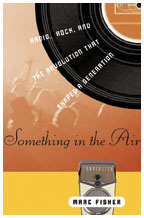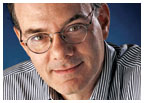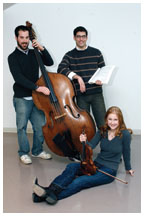March 21, 2007: Books and Arts
Reading Room
Connecting through the air
Marc Fisher ’80 profiles radio personalities
Making music on campus
Students combine performance and studies in building careers
For a complete list of books received, click here.
Marc Fisher ’80 writes a column about radio for The Washington Post. (Courtesy Random House) |
Reading
Room
Connecting
through the air
Marc Fisher ’80 profiles radio personalities
By Katherine Hobson ’94
From age 12 into his college years, Marc Fisher ’80 would listen to radio deejay Jean Shepherd’s evening show, broadcast from New York, and feel his imagination take flight. Shepherd’s monologues included his own impressions and experiences, as well as wholly fictional events, all of it combining to create a personal relationship with his listeners. “Without notes or a script he could tell stories that had a clear beginning and end, with characters you felt were real,” Fisher recalls.
 Fisher’s
late nights of listening in-spired a love of radio that has persisted
throughout his own career in print journalism, which has included nearly
20 years at The Washington Post, where he writes a column about radio.
His new book, Something in the Air: Radio, Rock, and the Revolution that
Shaped a Generation, published by Random House in January, looks at the
personalities — chiefly, but not entirely, on AM radio — who
took the medium from its post-television identity crisis in the late 1940s
and 1950s up to the present, chronicling how they maintained their bond
with listeners — and in some cases, destroyed it.
Fisher’s
late nights of listening in-spired a love of radio that has persisted
throughout his own career in print journalism, which has included nearly
20 years at The Washington Post, where he writes a column about radio.
His new book, Something in the Air: Radio, Rock, and the Revolution that
Shaped a Generation, published by Random House in January, looks at the
personalities — chiefly, but not entirely, on AM radio — who
took the medium from its post-television identity crisis in the late 1940s
and 1950s up to the present, chronicling how they maintained their bond
with listeners — and in some cases, destroyed it.
Fisher writes about people like Hunter Hancock, a white deejay in Los Angeles who was the first to cross the color line in the late 1940s by playing the “race music” offered up by black promoters. The new music was an instant hit and brought black music into the mainstream. He writes about Garrison Keillor and his Prairie Home Companion on public radio, the New York deejay Bruce Morrow (known as Cousin Brucie), and Rush Limbaugh.
In contrast to the earlier days of personal connection with listeners, the current state of AM radio, Fisher says, has gone in two directions: polarized, political talk radio by Limbaugh and others across the spectrum, and the very raunchy shows epitomized by Howard Stern. Between those two trends and the numbing sameness of segmented, impersonal, preprogrammed music stations, he says, “We’ve lost what really made radio connect to people’s lives,” he says.
Radio always has been afraid for its life, first after the invention of TV and now with the exploding number of options for listeners to get music and shows. It’s not clear, Fisher says, how or with what device people will listen in the future, but there definitely is an appetite for the content and commu-nity of good radio. “What I love about writing about radio is you can tap into people’s imaginations, since so much of radio happens in their heads,” he says.
Given that he worked in radio himself at Princeton, both at WPRB and
on the syndicated series Focus on Youth, which broadcast student interviews
with leading political and cultural figures, why isn’t Fisher on
the dial instead of on the page? Writing is his career, he says, but that
doesn’t mean he wouldn’t like a short-time gig. “To
this day, I’d love to spend a year being a screaming, top-40 deejay,”
he says. ![]()
Katherine Hobson ’94 covers health and medicine at U.S. News & World Report.
For a complete list of books received, click here.
 Red Earth (Latérite) — Véronique Tadjo, translated
by Peter S. Thompson ’70 (Eastern Washington University Press).
This collection of poems by African writer Véronique Tadjo explores
the visceral bond between West African people and their land. The poems,
printed in both French and English, form a narrative of love, outrage,
and loss. Thompson teaches Romance languages and literatures at Roger
Williams University.
Red Earth (Latérite) — Véronique Tadjo, translated
by Peter S. Thompson ’70 (Eastern Washington University Press).
This collection of poems by African writer Véronique Tadjo explores
the visceral bond between West African people and their land. The poems,
printed in both French and English, form a narrative of love, outrage,
and loss. Thompson teaches Romance languages and literatures at Roger
Williams University.
 Everyday Matters: A Memoir — Danny Gregory ’82 (Hyperion).
After his wife fell in front of a New York subway train on her way to
work several years ago, leaving her paralyzed from the waist down, the
author started drawing to make sense of the tragedy. In this book that
reads like a journal, Gregory expresses how he recovered his joy in life
through his drawings of everyday things, such as books, his dog, and kitchen
utensils. Gregory is also the author of The Creative License.
Everyday Matters: A Memoir — Danny Gregory ’82 (Hyperion).
After his wife fell in front of a New York subway train on her way to
work several years ago, leaving her paralyzed from the waist down, the
author started drawing to make sense of the tragedy. In this book that
reads like a journal, Gregory expresses how he recovered his joy in life
through his drawings of everyday things, such as books, his dog, and kitchen
utensils. Gregory is also the author of The Creative License.
 One Country: A Bold Proposal to End the Israeli-Palestinian Impasse
— Ali Abunimah ’93 (Metropolitan Books). The author, a Palestinian-American
journalist, advocates a controversial approach to the Israeli-Palestinian
conflict: the creation of a single state shared by Palestinians and Israelis.
Abunimah argues that Israelis and Palestinians are so intertwined geographically
and economically that the two-state approach cannot lead to security for
Israelis or civil rights for Palestinians. Abunimah edits the Web site
Electronic Intifada.
One Country: A Bold Proposal to End the Israeli-Palestinian Impasse
— Ali Abunimah ’93 (Metropolitan Books). The author, a Palestinian-American
journalist, advocates a controversial approach to the Israeli-Palestinian
conflict: the creation of a single state shared by Palestinians and Israelis.
Abunimah argues that Israelis and Palestinians are so intertwined geographically
and economically that the two-state approach cannot lead to security for
Israelis or civil rights for Palestinians. Abunimah edits the Web site
Electronic Intifada. ![]()
By K.F.G.
Bass player Dean Reynolds ’07, conductor Geoff McDonald ’07, and violinist Caitlin Tully ’10. (Beverly Schaefer) |
Making
music on campus
Students combine performance and studies in building careers
Violinist Caitlin Tully ’10 could have gone to a conservatory instead of to college. She performs as a soloist with major symphonies in the United States and in Europe and takes private lessons with famed violinist Itzhak Perlman in New York City. Music could have been her whole life, but she chose to come to Princeton because she wanted to broaden her education. She didn’t want to grow into an adult who knew only musicians, she says, and the better musicians she talked with told her to go to college — that the education would show up in her music. So far, she thinks her decision is paying off: “My music is becoming fuller and better.”
Few students arrive at Princeton already having established a professional music career as Tully has done. But, there are other outstanding student musicians on campus who want to make music their future livelihood and, like Tully, chose to attend Princeton and couple their musical training with a liberal arts education. They like the variety of studying a range of disciplines and getting to know students who are passionate about things besides music. Says Dean Reynolds ’07, a talented jazz bass player, “Some of my best inspirations for pieces have come from dialogues with non-musicians.”
Tully, who fell in love with the violin as she listened to the radio, and begged her parents to give her one for Christmas when she was 4 years old, practices several hours a day. As she works on a piece, she often figures out the “emotional story” behind the music. And she interprets the music based on “what makes most sense given the composers [and] the time in which they wrote.”
Since coming to Princeton Tully has cut back on her concert commitments to allow herself to settle into college life and make friends. On March 22–26, she will play Mozart’s “Concerto in G Major” with the Houston Symphony and in April will play several pieces at a recital at the Louvre in Paris.
To avoid missing classes, she works with her agent at IMG Artists to try to schedule concerts on weekends. Occasionally she does have to miss a class, however. “The life I have here is one of constant balance,” she says. This semester she has begun playing chamber music on campus through the Pro-gram in Musical Performance.
Her busy schedule of studies and practice doesn’t leave much margin for illness, printer breakdowns, or doing laundry. But she loves both Princeton and performing and wants to do it all. She knows that after college, her life will revolve around music and traveling to concerts. “I never wanted to do anything else as a career,” she says.
Geoff McDonald ’07 is not a professional, yet he is on his way to making a career in music. The assistant conductor of the University Orchestra, he is the most advanced conducting student for his age that Michael Pratt, conductor of the University Orchestra and director of the Program in Musical Performance, has seen at Princeton in 30 years. This spring he is busy auditioning for graduate school in hopes of obtaining a master’s degree in conducting.
McDonald has been conducting orchestras or choirs since his sophomore year of high school and been playing piano since age 5 and cello since age 10. He wanted to come to Princeton because he likes enriching his music with his academic studies, and the flexibility to continue studying voice, cello, and piano at the same time that he is developing as a conductor. It’s hard to say how many hours a day he practices because so much of what he does revolves around music — whether studying the composer Gustav Mahler for his thesis in the music department, dissecting a Beethoven score in preparing to conduct the University Orchestra or Sinfonia, singing with the Katzenjammers, or playing cello or piano with the orchestra. Had he chosen to go to a conservatory, he says, he might not have had such a varied experience and likely would not have been able to conduct until his senior year.
In January, he brought to life Beethoven’s “Coriolan” overture as he conducted the University Orchestra in Vienna. For a young conductor, the idea of interpreting a master’s score in the city where he built his reputation might seem daunting. But McDonald demonstrated the quiet confidence and knowledge of the composer that indicate the promise ahead. “Conductors cook very slowly,” says Pratt, and some of their best work occurs after age 60. But he sees “tremendous potential” in McDonald. For each score, says Pratt, a conductor must be able to answer two key questions: what he wants the work to sound like, and how to get the musicians to produce that sound. McDonald, says Pratt, “is on his way to being able to do that.”
McDonald hopes to join other talented alumni who are making a career of conducting, such as Hobart Earle ’83, conductor of the Odessa Philharmonic Orchestra in Ukraine, and Katherine FitzGibbon ’98, who is a conductor at Cornell University this year while she is finishing her doctorate in conducting at Boston University.
While McDonald and Tully came to Princeton knowing that music was their future, Reynolds wasn’t sure at first that he wanted to make a career of it. Reynolds, who began playing bass with a jazz ensemble in sixth grade, wanted to continue his jazz education in college but thought he might major in math. After getting more involved in the music department, he realized he wanted not only to major in music but also to make a job of it. “When I was in high school, jazz was once a week after school for about an hour and 10 Saturdays a year, and now it’s pretty much every day,” says Reynolds. Anthony Branker ’80, the head of Princeton’s jazz program, calls Reynolds one of the most talented jazz musicians on campus.
Reynolds, whose thesis deals with the challenges non-African composers face when writing African-inspired music, anchors a number of jazz ensembles as a bass player, plays for fun with a reggae band, composes music, and is studying piano. After graduation, Reynolds plans on moving to Philadelphia, where he will compose and perform gigs with drummer Chuck Staab ’07, tenor sax player Ben Wasserman ’07, and other musicians. Ultimately he hopes to attend graduate school to study ethnomusicology.
After four years at Princeton, he says, “I feel like a completely
different player.” ![]()
By K.F.G.


